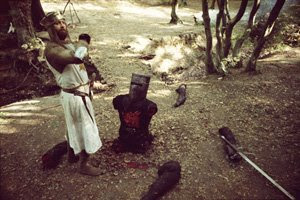stemelbow wrote:brade wrote:The claimed evidence is evidence for something. It's evidence that Joseph Smith showed some of his close friends and relatives an object and told them a story about it. It isn't evidence that the story he told about the object is true. That it isn't evidence that the story he told about the object is true is strengthened by the further principles that DJ explained, like that extraordinary claims require extraordinary evidence and Occam's Razor.
I feel like you are saying the same thing as I did, in a different way. The testimony of the 8 witnesses is evidence of an LDS truth claim--there were metal plates with engravings on them in Joseph Smith' possession, as he claimed. It's one piece.
No. You are exemplifying the problem with evidentiary foundation and relevance I talked about.
Joseph Smith merely having metal plates with engravings on them is not an LDS truth claim. Not very many people dispute that Joseph Smith at least had a prop that he showed a very small number of people. A truth claim is that Joseph Smith had metal plates with engravings on them
that were made by ancient Nephite prophets. What you're really claiming is that the testimony of the Eight Witnesses is circumstantial evidence of the latter. For that to be the case, the Eight Witnesses would have to have some knowledge
independent of Joseph Smith to talk about what the plates actually were. They did not and could not possibly have had any such independent knowledge. The "witness" about the plates is still Joseph Smith, not 8 other individuals. You still have to take Joseph Smith's word for it that the plates actually were an ancient Nephite record.
Apparently desiring to remove any possible hope that you understand the issues, you also said this:
You are attempting to suggest that claimed evidence can't be considered evidence because it doesn't support the ultimate claim, it seems.
No kidding. That's exactly what I'm saying. That's what "relevance" means. If a piece of evidence does not support the ultimate claim,
it is not relevant. If a purported piece of evidence is not in fact what it claims to be, then it has no foundation and
is not evidence at all. Because you have no foundation for the Testimony of the Eight Witnesses, you cannot reasonably use it as a piece of circumstantial evidence to prove that the object they were shown was an ancient Nephite record that Joseph Smith translated by the power of God. In other words, because it has no foundation, it is not relevant.
The Testimony of the Eight Witnesses has no foundation because the Eight Witnesses were not qualified to say what the plates they saw actually were. The Testimony of the Eight Witnesses is not relevant because "Joseph Smith had metal plates with engravings on them, but nobody knows what they really were" is not a claim the LDS Church relies upon to show that it is the True Church. The Testimony of the Eight Witnesses is nothing more than an invitation to
jump to conclusions that are not warranted by the facts that would have been known by those witnesses.
